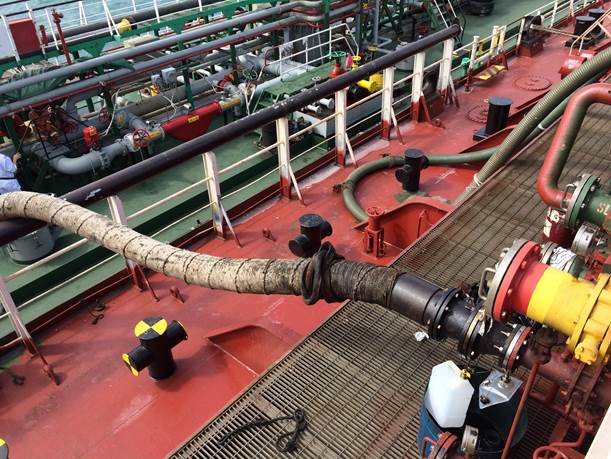Bunker and bunkering related disputes are a repeat problem for owners and charterers. Members are advised to ensure that this very critical part of a ship's operation is subject to carefuly risk managemet, both at the contracting and at the operational stages.

Bunkering with sampling at the manifold in progress (Source: Skuld)
Bunker disputes
The Association has over the years dealt with many disputes relating to bunkers and bunkering and typically these fall in to three broad categories:
a. disputes over quantity supplied
b. quality and contamination issues
c. payment and credit problems
Often this meant having to investigate the issues "post event" and deal with the facts and evidence such as they were. It also meant having to work with contract terms, such as they may have been agreed.
Even with the recent significant, and for the time being sustained, drop in oil / fuel prices, these matters need to continue to be a priority for owners and operators as sums involved are still substantial, the damage caused by bad bunkers to a main engine can be severe, and the risk of legal action by unpaid suppliers is very real.
This is an area where all the efforts made towards prevention can have a direct and positive effect, but where a less than diligent approach less ample scope for disputes, extra costs and ultimately significant losses.
In the bulletin from "The Bunker Detectives" AVA/2015/0020, an overview is provided as to what steps can be taken to prevent losses or, at least, deal with situations effectively should a problem arise.
Risk management
Commercial
Members will be very familiar with the structure of the bunkering business as well the typical contract terms found in supply contracts. That means it is not unusual for the performing physical supply vessel, as well as the physical supply, to involve different parties to the one which contractually agreed to perform the supply. Furthermore there may be multiple parties involved including intermediaries like bunker brokers. The still relatively recent issues arising out of the bankruptcy of OW Bunker A/S (as well as some affiliated companies) highlighted the potentially complex transactional arrangements that may be involved in the supply of fuel.
Furthermore, it is often the case that the terms of the supply contract can be very tight, with short time limits for notifying claims (sometimes as short as seven days), restrictions on the evidence that can be used to pursue the claim as well as limits on the amount of damages that may be recoverable (often limited to the value of the supply). Whether or not it is possible to negotiate better terms from the vessel's point of view depends a lot on the parties respective bargaining position and industry practice.
The terms which members will have more control over are the charterparty terms, and it is here where the parties need to decide on the allocation of risk as to the supply of bunkers, amount and specifications, who will arrange and pay for it, will surveys be done, who will pay for those, what evidence can be used for dispute resolution, etc.. Careful thought should be given to the applicable charter clauses based on past experience.
The "counterparty" risk factor, which could mean a direct charterparty risk or indeed a risk of the supply chain, is one that can be managed in part by way of careful consideration of whom to do business with, and while shipping continues to be in a challenging period of time this issue is one that should always be in mind prior to concluding any contract.
Operational
At this level, it is the ship's crew that is in the frontline of protecting against the possibility of a problem occurring. Well trained crew, being able to dedicate sufficient time to the task of bunkering, will be able to ensure that all possible checks are made and to verify - as far as that is possible - that the supply is according to pre-described terms.
In particular the crew can:
- duly pre-plan the bunkering operation and allocate sufficient personnel to monitor the same
- where possible, seek to isolate new bunkers in separate tanks and avoid mixing with existing bunkers on board
- undertake (whether with or without surveyor assistance) careful calculations to check the quantity supplied
- ensure accurate samples are taken at the vessel's manifold
- have those samples witnessed and appropriately sealed to preserve the evidential value
- check all documentation tendered and be alive to attempts to introduce contract terms or bind the vessel itself to the supply by way of clausing in the bunker delivery note (such should be resisted)
- keep a careful record of the whole operation, and where safe and permitted : keep a photographic record, too
- undertake follow up checks with the receiving tanks to see how much settling occurs post supply
- if the vessel has subscribed to a bunker testing programme, avoid (if possible) using the new bunkers until test results are available
- monitor engine performance post change over to the new supply
With such steps, as well as other measures, members can seek to manage the risks and mitigate against possibly negative consequences.
In any event, should members have a concern about a bunkering operation, they are encouraged to make soonest contact with the Association.
Further reading
Members will wish to have reference to Skuld's dedicated resource section on bunker fuel.
In particular members will wish to consider this advisory in conjunction with the previous advisory on so called "cappuccino" bunkers.
For vessel specific enquiries, members are asked to contact their usual Skuld business unit.
The Association is grateful to The Bunker Detectives for contributing to this advisory.